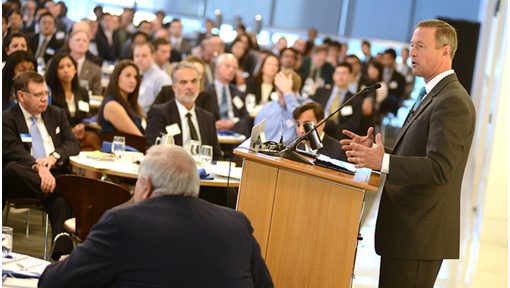 Many students dread making public presentations. Glossophobia, or fear of public speaking and speech anxiety, is one of the most common phobias, effecting as much as 75% of the population. Yet giving presentations and other forms of public speaking is an important part of developing professionally. Therefore it is important for students to overcome these fears and to find ways to excel at public speaking.
Many students dread making public presentations. Glossophobia, or fear of public speaking and speech anxiety, is one of the most common phobias, effecting as much as 75% of the population. Yet giving presentations and other forms of public speaking is an important part of developing professionally. Therefore it is important for students to overcome these fears and to find ways to excel at public speaking.
Here are 5 tips for students to help overcome a fear of public speaking:
1. Know your material. It is important to know the material you are presenting well and to be able to speak fluently about the subject matter. Having a firm grasp and understanding of what you are presenting will help you feel more comfortable during your presentation and will also project confidence to your audience. Be sure that you understand the material being presented inside and out. Come up with potential questions that the audience might ask and be prepared with your answers. Again, the better you know the subject matter, the more confident you’ll feel.
2. Think positively. We’ve all heard the benefits of positive thinking. These benefits can also apply to your presentation. Going into the presentation with a positive outlook will not only give you a boost of confidence, but that will also be projected to the audience. Thinking positively in general has been known to lower stress levels. Focusing on a positive reaction to your presentation and successful outcomes will help reduce your anxiety around public speaking. Do you remember the last time you achieved something amazing? How did that feel? Use those emotions to your advantage and make them your weapon on stage. Focus on these good emotions and try to avoid thinking of things that might go wrong during your presentation.
Positive thinking will let you do everything better than negative thinking will. –Zig Ziglar
3. Learn from others. Public speeches come in a wealth of forms: Seminar series, conference talks, journal club meetings, student presentations and more. One can learn a lot of things from observing these talks. Make a point to observe others in public speaking roles and consider: Which speech did I enjoy and why? Which speaker was most appealing? What made one speech better than another? After assessing other speakers, think about your presentation style, and how you can imitate some of the characteristics of the speakers you preferred.
4. Be aware of your body language. Non-verbal communication is an important skill to master when giving presentations. Your body language may convey unintended messages to your audience. For example, excessive fidgeting shows nervousness and conveys a sense of anxiousness. When practicing your speech, do so in front of a mirror. Notice any repetitive movements you may be making. Make a concerted effort to avoid fidgeting, shuffling, or any other movements that may indicate to the audience that you are nervous. There are several tricks to help you avoid making these unconscious nervous movements (e.g., mindfulness, holding a pen or paperclip firmly when speaking, and so forth). Avoiding these movements should help you as the presenter to feel a sense of calmness and ease during the presentation.
5. Practice. One of the most important things you can do to lessen anxiety before a big presentation is to practice. For one, this will allow you to find any hiccups in the presentation that you’d like to avoid. If there is a phrase or sentence that causes you to become tongue-tied, toss it or change it. Record yourself. Hear how the presentation sounds. Practice in front of a mirror and in front of friends. Allow others to give you honest feedback about the presentation. Determine what your strengths are in presenting and focus on those, and work on areas that need improvement.
 You can do this!
You can do this!
Humans are often terrified that our deepest fears and emotions will be noticed by other people. We sometimes believe that they’ll uncover these fears through our tone of voice, sweaty faces, or accelerated breathing. Fortunately, we can give ourselves a boost of confidence by becoming comfortable with what we’re trying to convey.
It is common to be nervous when giving public speeches. Many people have this fear, so know that you are not alone! Public speaking is not a natural-born skill for anyone, nor is it even a miraculous talent for most people. Consider it a learned ability that can be mastered over time by trying some of these tips. Visit the London Speaker Bureau for more information about public speaking.
Editor’s note: Davis Miller is a student in psychology at the University of Alberta.



 Growing up, I dreaded public speaking. Despite my efforts to keep a safe distance in the back of the classroom, presentation day would eventually rear its ugly head.
Growing up, I dreaded public speaking. Despite my efforts to keep a safe distance in the back of the classroom, presentation day would eventually rear its ugly head.